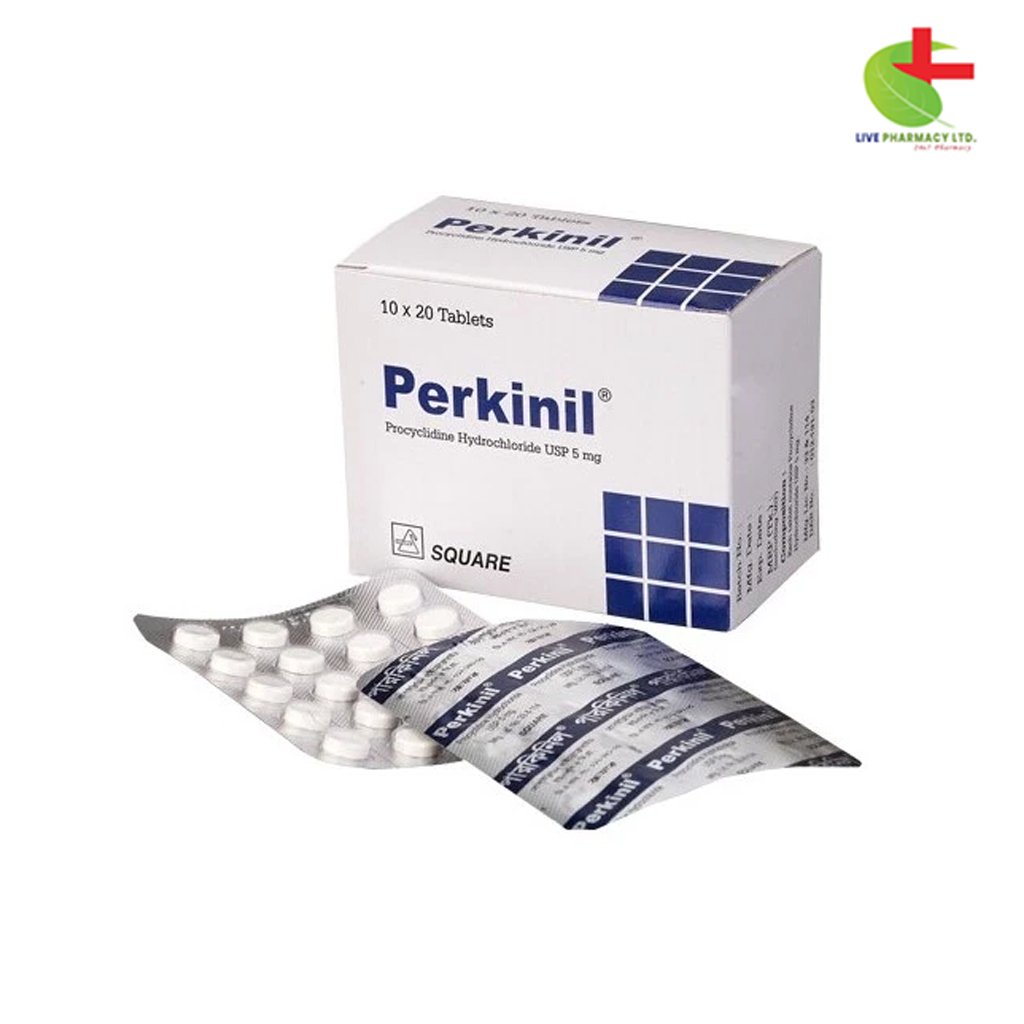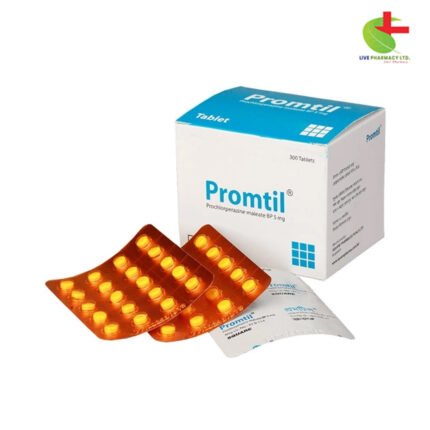Perkinil 5
25.00৳ Strip
- Perkinil, available at our pharmacy, serves as an adjunctive treatment for diverse parkinsonian syndromes.
- Formulated with procyclidine hydrochloride, it mitigates symptoms such as tremors and muscle rigidity.
- Administered orally or through injection, Perkinil effectively manages extrapyramidal symptoms induced by neuroleptic medications.
- With careful consideration for special populations, our pharmacy ensures safe and tailored treatment for Parkinson’s symptoms.
 Brand
Brand
|
Square Pharmaceuticals PLC |
|---|---|
 Generics
Generics
|
Procyclidine Hydrochloride |
Indications
Perkinil is prescribed as an additional treatment for all types of parkinsonian syndrome. Primarily, it addresses the symptoms of idiopathic (paralysis agitants), postencephalitic, and arteriosclerotic parkinsonism. Its main function is to manage troublesome extrapyramidal symptoms, including pseudoparkinsonian manifestations, acute dystonic reactions, and akathisia triggered by neuroleptic medications such as phenothiazine derivatives.
Pharmacology
Procyclidine hydrochloride, a relatively low-toxicity antimuscarinic antiparkinsonian agent, acts as a synthetic tertiary amine. This medication counteracts the relative cholinergic excess believed to occur in parkinsonian conditions due to dopamine deficiency. It is swiftly absorbed from the gastrointestinal tract and quickly metabolized in the body. Intravenous administration typically takes effect within 5 to 20 minutes, with effects lasting up to 4 hours.
Dosage & Administration
Tablet form: Administer orally, preferably after meals. For Parkinsonism: Begin with 2.5 mg three times daily, gradually increasing to 5 mg thrice daily, with an optional additional 5 mg dose at bedtime. Adjust dosage as tolerated until reaching a total daily dose of 20 to 30 mg divided into 3 to 4 doses. For drug-induced extrapyramidal symptoms: Initiate with 2.5 mg three times daily, adjusting by 2.5 mg increments daily as necessary and tolerated. IM or IV injection: Administer 5-10 mg, with the option for repetition if needed after 20 minutes, with a maximum daily dose of 20 mg.
Interactions
Agents with anticholinergic properties such as amantadine may enhance the anticholinergic activity of procyclidine. Concurrent administration of procyclidine may reduce the absorption of ketoconazole.
Contraindications
Exercise caution when administering to children and elderly patients. Use with care in patients with diarrhea, cardiovascular disease, glaucoma, urinary retention, or hepatic and renal impairment. Safety during pregnancy is not established, and there is insufficient data on excretion in breast milk.
Side Effects
Dry mouth is the most common adverse effect at typical dosage levels. Occasionally, mydriasis, blurred vision, and gastrointestinal discomfort (nausea, vomiting, constipation) may occur. Allergic reactions like rash or muscular weakness may occasionally manifest. Higher doses may induce vertigo, confusion, and hallucinations. Adjusting dosage and taking the medication after meals can help minimize adverse effects.
Pregnancy & Lactation
The safety of procyclidine during pregnancy, lactation, or in women of childbearing age should be carefully evaluated against potential risks to both mother and child.
Precautions & Warnings
Use with caution in patients with hepatic or renal impairment, children, elderly, pregnant or lactating individuals. Patients with mental disorders may experience exacerbation of psychotic episodes with Perkinil. Abrupt withdrawal should be avoided to prevent rebound Parkinsonism symptoms.
Use in Special Populations
Safety and efficacy in pediatric patients have not been established, so the use of Perkinil in this group should be carefully considered.
Therapeutic Class
Antiparkinson drugs
Storage Conditions
Store below 25°C, protected from light and moisture, and out of the reach of children.













Reviews
There are no reviews yet.